Key Points:
- All T-Mobile Home Internet, Small Business Internet, and Business Internet Unlimited lines now have a 1.2TB deprioritization limit.
- This new limit is considered a fair-use policy that applies to older and newer plans.
- Customers will get notifications when they approach the 1.2TB limit and once they reach it.
T-Mobile offers a line of very popular unlimited data plans intended for homes and businesses called T-Mobile Home Internet/Small Business Internet and Business Internet Unlimited. These plans are popular connectivity options for stationary and mobile users because they combine unlimited high-speed data for a reasonable price.
In January 2024, T-Mobile raised the price of these plans from $50 to $60/month for new customers and also added a 1.2TB deprioritization threshold for customers who signed up after January 18th, 2024.
T-Mobile has now extended this 1.2TB deprioritization limit to all of these plans.
So, what does this mean, and is it a big deal?
Table of Contents
TMHI 1.2TB Threshold Video
T-Mobile Home Internet, Small Business Internet, and Business Internet Review
First, a quick review of the affected plans.
A leaked internal document obtained by the T-Mobile Report states the policy includes "all 5G internet customers." The plans that we track that fit that category are the Home/Small Business Internet and Business Internet Unlimited plans, and a T-Mobile representative confirmed to us that these are subject to the new policy.
T-Mobile Home Internet is intended to be a fixed-location cellular service to compete with wired internet service providers. For a single monthly price, including taxes and fees, customers get unlimited data and a 5G cellular router. T-Mobile Small Business Internet is the exact same plan except on a business account instead of a consumer account.
 This plan is great, but it does have downsides:
This plan is great, but it does have downsides:
- All data is deprioritized compared to other customers. And now, with this new policy, after 1.2TB of use, data is prioritized last on T-Mobile's network.
- The plan must be used in the included gateway device. Only some gateway devices have antenna ports; most do not (See our Gear Center entry for full details on available devices).
- The plan is only available at specific locations where T-Mobile has excess capacity, so customers need a valid address in one of those areas to sign up. There are, however, "Lite" versions of the plan with data caps available in other areas.
- The option is intended for fixed-location use only. T-Mobile is not currently enforcing this, so you can use it while mobile, but T-Mobile could start enforcing those terms in the future.
 Business Internet Unlimited is a business-only plan with very similar terms as the Home/Small Business Internet plan, but it has one key advantage - it is BYOD and can be used in any data device. It is also not available in stores or online, so you must go through a business sales rep to get the plan. T-Mobile also offers optional business-only services with this plan, such as managed devices and static IP addresses.
Business Internet Unlimited is a business-only plan with very similar terms as the Home/Small Business Internet plan, but it has one key advantage - it is BYOD and can be used in any data device. It is also not available in stores or online, so you must go through a business sales rep to get the plan. T-Mobile also offers optional business-only services with this plan, such as managed devices and static IP addresses.
1.2TB Deprioritization Policy Explained
The first thing to make clear is that this is a network management policy, and there is no hard throttle after a customer uses 1.2TB.
Instead, once a line hits 1.2TB of usage in a billing cycle, T-Mobile's system kicks that line to the lowest priority level on T-Mobile's network for the rest of the billing cycle. This means that your data will be prioritized behind everyone else on the network.
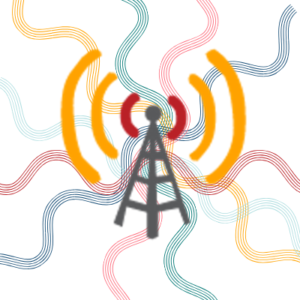 If the tower you are connected to isn't congested, or the congestion is mild, then this deprioritization will not have much effect. But if the tower is highly congested, your data speeds and performance can slow to almost nothing.
If the tower you are connected to isn't congested, or the congestion is mild, then this deprioritization will not have much effect. But if the tower is highly congested, your data speeds and performance can slow to almost nothing.
So, how this will affect your service entirely depends on the current conditions of the tower you're connected to.
T-Mobile states that customers will receive notices when they approach 1.2TB of usage to let them know when they are close to the threshold and again onces they've reached it.
Is this A Big Deal?
While it's always disappointing when a carrier makes retroactive changes to terms and plans that don't benefit customers, in this case, the new policy won't affect the vast majority of customers since relatively few, especially in our audience of mobile users, use more than 1.2TB of data in a month.
Additionally, this policy is consistent with policies from other internet service providers, including landline providers. Many of these have hard caps at 1.2TB and then charge for additional data after that point. Cellular providers do have a legitimate need to manage limited spectrum and network resources, and all carriers utilize network management practices to deprioritize heavy data users on their networks.
So, we don't think new or existing T-Mobile customers on affected plans should worry too much, as the 1.2TB threshold is higher than most of our core audience of RVers and boaters typically use from a single internet connection, and the service will still be usable whenever the local tower isn't congested.
T-Mobile Not Updating Documentation
One particularly frustrating aspect of this change for many customers is that, at press time, T-Mobile has not updated its core policy documents and legacy plan terms to reflect this change.
The leaked internal document from the T-Mobile Report shows this new policy went into effect on April 10th. However, as of April 18th, when this article was published, T-Mobile's Open Internet terms still do not reflect this policy change and state that the 1.2TB limit only affects new customers after January 18th, 2024, a change implemented with the price increase we reported at the time. The current terms still reflect this old language:
As of January 18, 2024, new T-Mobile Home Internet customers who exceed 1.2TB of data usage for the current billing cycle will be prioritized last on the network.
Similarly, the terms in customer account portals for legacy plans are not updated to reflect this new restriction.
This has resulted in customers receiving emails and notifications like the one below. When customers click on the "Find out more" button, they are taken to the Open Internet terms page with old and incorrect information and wonder if the email is a mistake.
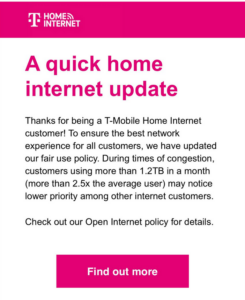
It's unclear why T-Mobile is not able to update its website to avoid customer confusion. Once they do, we'll update this story to reflect that fact.
May 16, 2024 Update:
A couple of weeks ago, we contacted T-Mobile corporate PR about this issue, and they said they would address it. Now, it has been. The new wording in T-Mobile's Open Internet terms states:
In general, T-Mobile Internet customers receive the same network prioritization as Mobile Wireless Heavy Data Users. As of May 8, 2024, T-Mobile Internet customers who exceed 1.2TB of data usage for the current billing cycle are Internet Heavy Data Users who will be prioritized last on the network.
Concluding Thoughts
Overall, it's unsurprising that T-Mobile has put a deprioritization limit on its very popular 5G unlimited data plans. However, a 1.2TB threshold on a cellular plan is actually quite generous and is consistent with the limitations of many land-line cable providers, which these plans are intended to compete with. This limit is sufficiently high that most users will not be affected.
Even for those who use more than 1.2TB a month, the effects may be minimal once the threshold is crossed.
Regardless, these plans are still great values for mobile internet data and remain Top Pick options.
Further Reading
- Gear Center: Review: Unlimited Home and Business Data Plan and Gateways by T-Mobile
- Gear Center: Review: T-Mobile Business Plans
- Guide: The Best Cellular Data Plans for RVers & Cruisers
- Guide: Which Cellular Carrier is Best for RV or Boat Mobile Internet?
Related News:
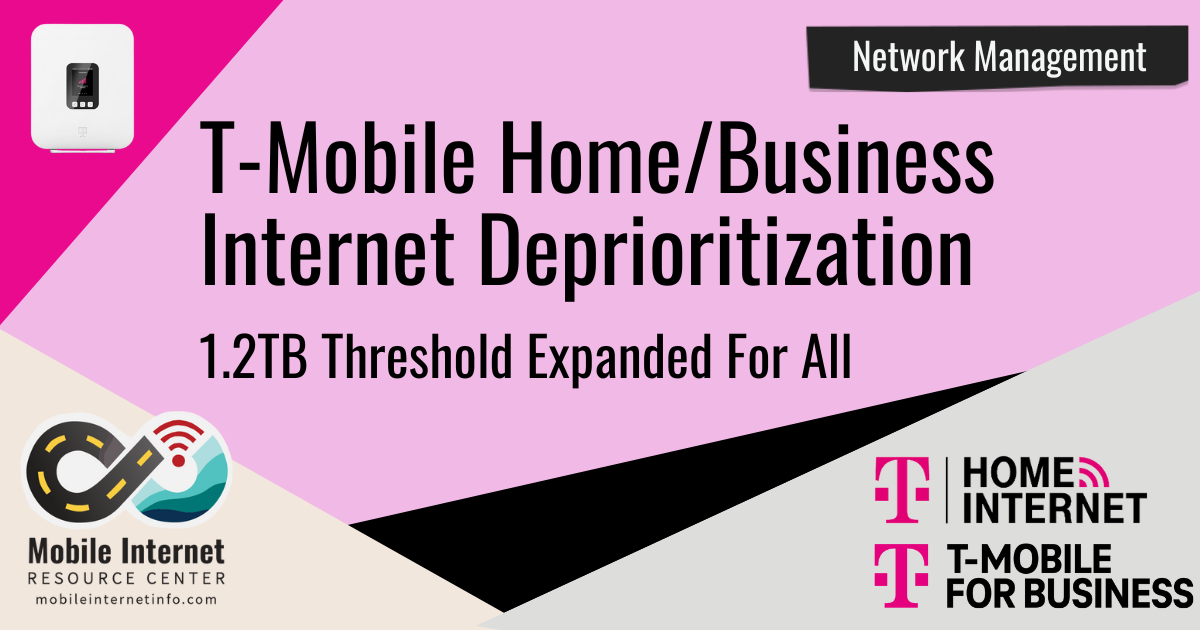

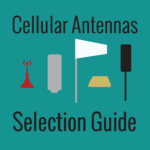


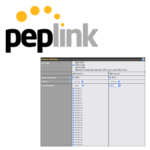
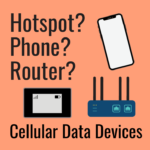

 Mobile Internet Resource Center (dba Two Steps Beyond LLC) is founded by Chris & Cherie of
Mobile Internet Resource Center (dba Two Steps Beyond LLC) is founded by Chris & Cherie of